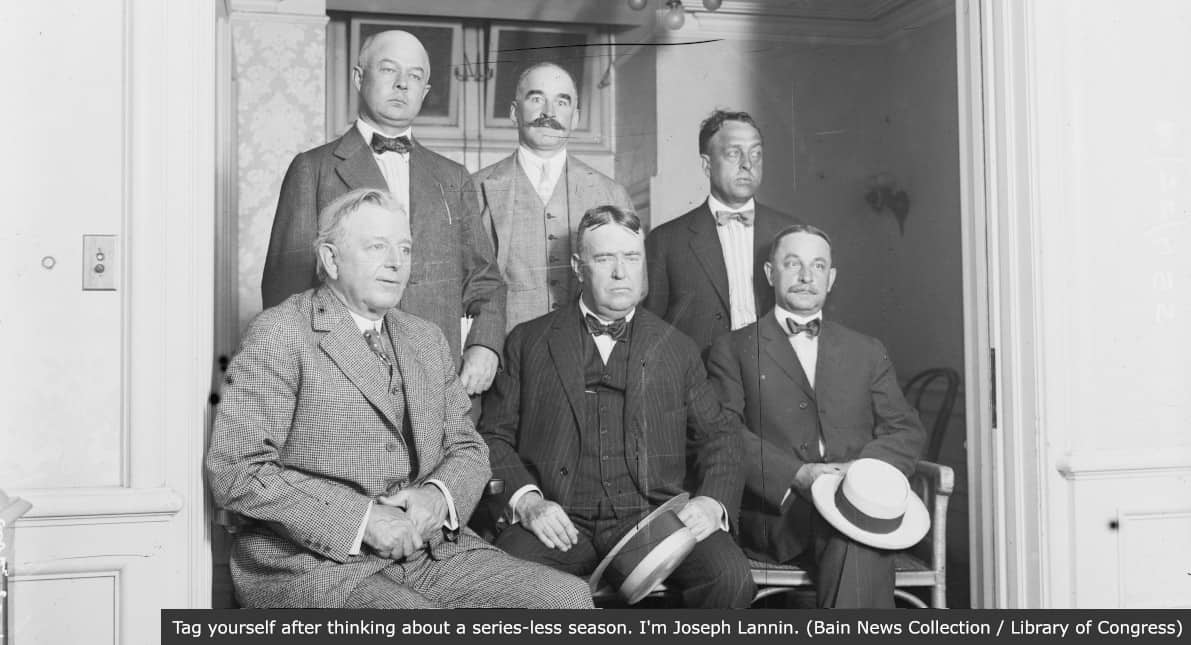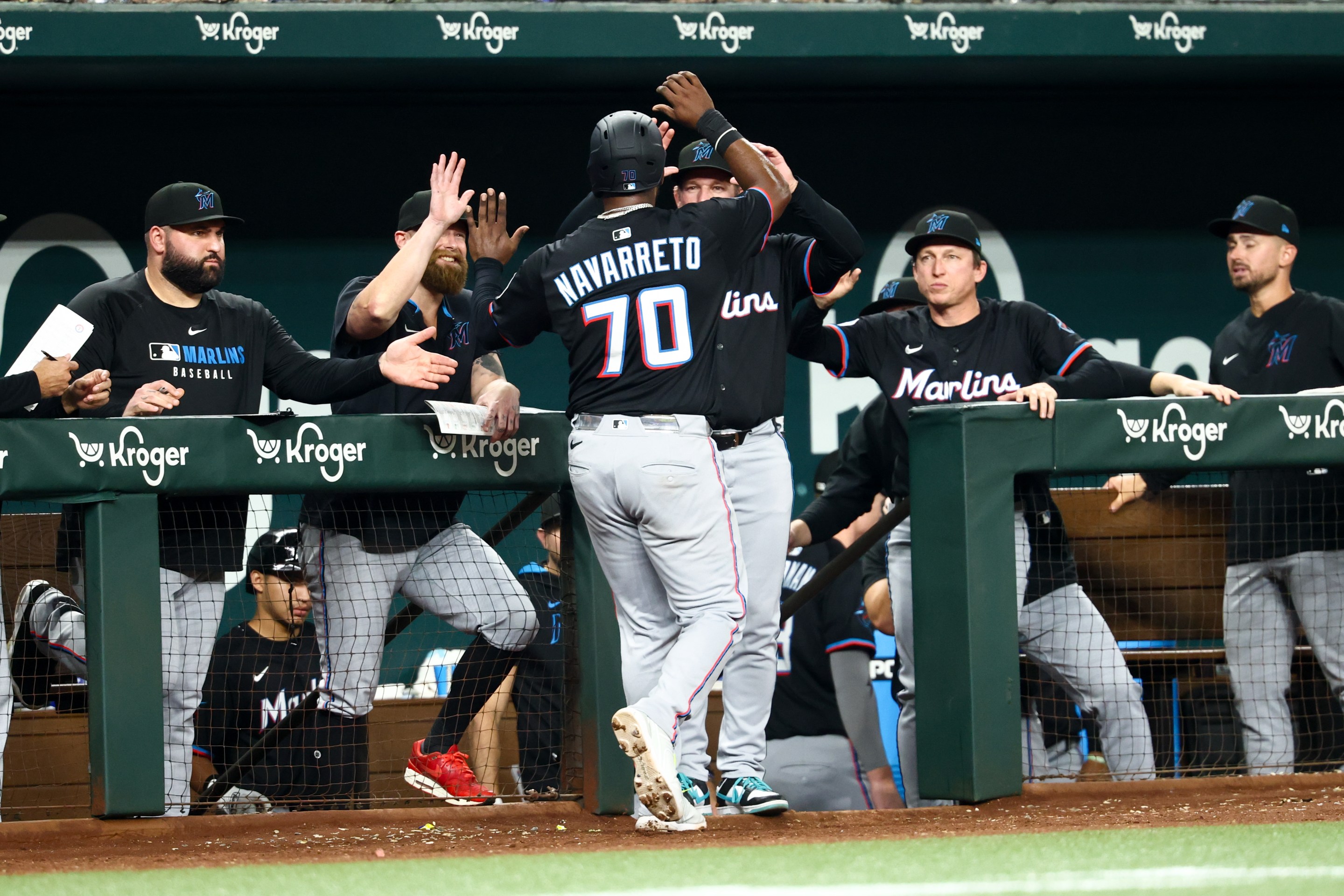Major League Baseball is 151 years old. It's got about a half-century on the NHL and NFL, and it's more than twice the age of the NBA.
In terms of the actual feel of the game, it's even older. The NHL's Original Six lasted until 1967, and football didn't mature until around the same time. The NBA struggled to secure its foothold until the 1980s. Major League Baseball's "Modern Era" dates all the way back to 1920.
Baseball would probably be a lot more eager to adapt if it were shaped by TV instead of radio, and plane travel instead of train travel. A brand-new baseball league would probably consider 162 games insane, especially in the era of load management and sleep studies. A smaller number would suffice in service of a longer postseason. Maybe the new founders would settle on 82 games in accordance with the frameworks set by older leagues.
But because baseball was the only national game, with its rhythm established by forces that no longer set the itinerary for America, it does some things in a very strange way.
For instance, MLB is the only league that arranges its regular season in series, mostly because the sport has always crammed a lot of games into not a lot of time, and it started when teams had to adhere to the existing timetables of rail companies. The NBA eliminated four-games-in-five-nights scheduling because of how it sapped teams and the quality of play, but that's de rigeur for baseball, which has the luxury of transferring the game's heaviest workload to a previously idle player on a five-day rotation.
Would baseball think of its season as a connection of series if it didn't have to? Well, if baseball can ever get off the ground with either of the two floated plans -- playing all its games in Arizona, or splitting the pot with Florida and running Grapefruit and Cactus leagues for the whole year -- it'll have the option of ditching the series concept for at least one year. No matter where a team plays during the season that spring training never ended, its players can return to their own rooms at the end of the night.
That's a luxury baseball has never encountered, and baseball should give it a shot if the national coronavirus response creates an opening to start a season.
* * * * * * * * *
My guess is that a lack of series would make the season worse, but I don't necessarily trust my own fandom when it comes to individual facets of a baseball season. I think I'm just good at accepting the sport's weird remnants and vestigial organs. Start a sentence with "MLB is the only league that..." like I did a few paragraphs ago, and I'll probably have some fondness of whatever that is.
In a recent article for ESPN.com, Sam Miller noted that baseball still leans on runs, hits and errors for its line scores when only the first column is reliable in telling you anything about the game. Broadcasts and websites should have advanced well beyond the "R | H | E" construct, subbing in plate appearances, men on base, strikeouts, pitches seen or anything else telling you how the action has been shaped beyond the score. But baseball tends to not change the shape of itself unless it sees ample legal or financial reasons, so those three measures endure.
As errors became almost a relic of the past, and as walks became as much a part of a hitter's daily merit as hits, and as newspapers barely exist as a medium, and as the idea of a box score being somehow unavailable is absurd, and as the modern box score -- at, say, Baseball Reference -- has 10 times the information that a 1907 box score did, R/H/E survives. It's the last thing I saw in the last baseball game that mattered.
I'd be fine with seeing the line score remodeled, similar to the way I prefer seeing OPS, wOBA or WAR flashed on the screen instead of batting average or RBIs. But I also don't mind that the old way endures, and I have even warmer feelings for more controversial targets that probably shouldn't exist:
The pitcher win? Sure, it shouldn't define a guy, but it's an inefficient-yet-effective way to understand how much fun we had on the days a particular individual took the mound.
The quality start? The 2003 White Sox taught me that six innings and three earned runs can't be taken for granted.
Non-universal DH? It's absurd that a major league lets half its teams play with such fundamentally different rules, but "making sense" was never a prerequisite for things I enjoy. I found Hawk Harrelson's ignorance of the National League both an abdication of his duties and somewhat charming, partially because the sport implicitly encourages such provincialism. If you reject dissonance at every turn, you'll miss out on Thelonious Monk.
The unbalanced schedule? I have a rolling roster of the Most AL Central Team in my head, and I'll probably subject it to debate over the coming weeks.
If baseball ever ironed out those wrinkles, I'd be sad to see them go, even if they didn't possess enough logic to maintain at all costs. And then in five years or fewer, I'd succumb to the logic and enjoy the new way of doing things just the same, especially when baseball mutates further and makes those advancements obsolete.
* * * * * * * * *
The only changes I never really warm up to are the ones that diminish the meaning of the regular season. As you might be able to discern by this particular website and this particular team, I find the journey more interesting than the destination.
On one hand, that's partially a defense mechanism, because "the destination" is almost always "the ditch," and how you ended up there is the story people want to hear. But this discussion reminds me of the story Emma Baccelieri wrote about watching a game between two 100-loss teams last September and finding plenty of meaning in a "meaningless" game.
When I miss baseball in the winter, I do not miss the postseason. I do not miss the highlights, I do not miss the debates over who will deserve the Cy Young, I do not miss anything that seems as if it is meant to be remembered. I miss the cadence of games. I miss MLB’s copyright disclaimer on broadcasts. I miss background noise. I miss the Orioles versus the Tigers on September 16.
Listening to Monday’s game between the Orioles and Tigers was not an especially productive use of time; there was nothing efficient, or instructive, or beneficial in it. There was no point. And it was great: It meant something.
Maybe I wouldn't second this sentiment so strongly if we could watch that kind of game right now, or if the White Sox ever reached the postseason, but I hope my priorities wouldn't shift much. I'd be a little sad that my enjoyment of the first six months was contingent on the existence of a seventh.
Along those lines, I like when the game rewards teams built for depth. Maybe the 2005 White Sox caught lightning in a bottle in the big picture, but you can't knock them for what they accomplished that year. They led their league in wins during the regular season and they went 11-1 in the postseason, with a rotation that turned in four consecutive complete games during the ALCS along the way. That's my transcendent ideal of a baseball champion, and I might not trade it for two World Series.
Each expansion of the postseason erodes the emphasis on depth and whole-squad contributions, which is why I'd suspect that the elimination of in-season series ultimately wouldn't appeal to me. Imagine seeing divisional nemeses like Corey Kluber, Justin Verlander and Johan Santana squaring up against the Sox seven times in eight games, rather than six out of 19. Imagine those 2003 White Sox throwing Bartolo Colon, Esteban Loaiza and Mark Buehrle at every key opponent instead of having their Mike Porzio dangling out there for the world to see at the worst possible time. The three- and four-game series force each teams to hurl their collective quality at each other every time they meet, for better or for bloodier, and I think that's how I like it.
But contained to a single season, it'd be fun to see how quickly managers adjusted to flexibility, and it wouldn't be out of step with baseball's history. When teams guaranteed far less money to pitchers, they could be more cavalier with their arms, so a number of managers leveraged their best starters despite irregular schedules. The rivalry between the White Sox and Yankees in the 1950s was so heated in part due to Al Lopez and Casey Stengel, who liked to save their best pitchers for those series.
We now only see this in the postseason, which is one of the ways October baseball fails to resemble what came before it. Looking at it from that stance, it'd be kinda cool to see more consistency in strategy from the regular season to the postseason, even if former is abbreviated. I think I'd temporarily enjoy debating whether Rick Renteria should have saved Lucas Giolito for the Dodgers later in the week on six days' rest, or whether he should have tried banking cheap wins against the Mariners and Royals beforehand.
I say "temporary" because I only like those arguments in moderation. Zack Britton is still salty at Buck Showalter for not using him in the 2016 wild card game, just like Gerrit Cole made it messy after last year's Game 7 when A.J. Hinch didn't break the emergency glass for him. Deciding when to empty the reserves and debating whether it matters is a big part of baseball's tension. It just gets tiring when the second-guessing of managers defines the entire postseason, because I think most fans want the players making or breaking the game (another point for the 2005 White Sox).
That said, while a team might be able to hide the weak links on the pitching side, it might be harder to mask flaws offensively. Take the 2019 Cubs, who hung around the NL Central race all season despite persistent struggles against left-handed pitching. They posted a losing record against lefty starters thanks to a bottom-third offense, but they only saw a lefty starter 32 times (14-18). A lopsided team like that might go from seeing a lefty starter 20 percent of the time to 30 percent of the time if opponents are trying to cut them down, and the teams with more balanced lineups might gain a few games if they don't present a convenient way to optimize against them.
I can see enough value in a schedule full of randomized individual games to give it a shot, especially in a season few will treat as valid. The White Sox got a taste of this at the end of 2008, when they had to beat the Indians, Tigers and Twins over the last three days of the regular season to win the AL Central, and that was nuts. I can just see an unremarkable season turning the schedule into an indistinguishable parade of opponents, whereas series always contain their own drama. Whether a team sweeps or gets swept, salvages a split, or wins the first game only to lose the back two, there's always a little story contained in them, even for teams that are well out of the hunt. While these building blocks of the regular season are the products of forces baseball wouldn't confront if it started 50 years ago, I think that particular piece of history helps more than it hurts.





